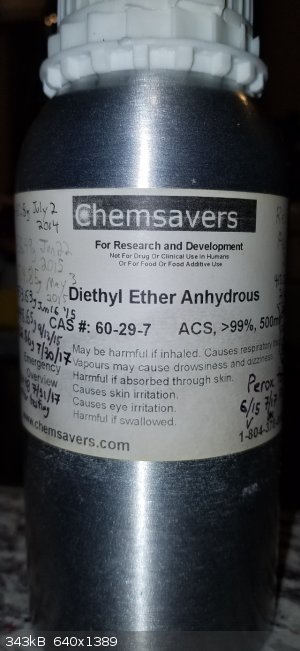sbreheny
Hazard to Others
  
Posts: 145
Registered: 30-1-2014
Member Is Offline
Mood: No Mood
|
|
Diethyl ether storage and peroxides
I wanted to add a data point of anecdotal experience in long-term storage of diethyl ether. I bought three bottles of ether on eBay a few years ago.
Two of them are in storage and one is in my active stock. I think the one in my active stock is the only one I've opened but I cannot verify that
right now. The one in my active stock was opened in February 2014. I've been periodically testing it for formation of peroxides (by acidified sodium
iodide and also by peroxide test strips) and I've never seen even the slightest hint of peroxides on these tests. Examination of the inside of the
bottle shows no deposits on the bottle walls.
The bottle is aluminum with a double closure (plastic stopper and an aluminized plastic screw-cap). I've been recording the mass decrease over time
and the area where the bottle is stored does smell slightly of ether. It loses about 30 mg of mass per day. It has spent most of its time in a 20 to
25C environment.
The supplier told me that it has a small amount of BHT added to reduce peroxide formation.
I don't know ultimately whether storing ether this way long term is safe - I just wanted to add my experience and see what others thought about it.
Photo of bottle as well as a screenshot snippet of my test record spreadsheet attached.
 
|
|
|
draculic acid69
International Hazard
    
Posts: 1371
Registered: 2-8-2018
Member Is Offline
|
|
So it's losing about a gram a month to what? evaporation? Or decomposition of some sort that isn't peroxide formation? Ethers freak me out too
although I am now better equipped to deal with storing them safely.
|
|
|
nimgoldman
Hazard to Others
  
Posts: 304
Registered: 11-6-2018
Member Is Offline
|
|
I think the loss of weight is normal due to evaporation. I encountered slight leakage of vapours from bottles with GL45 screw caps even when tightly
sealed.
I think the loss is kind of inevitable unless you really invest in some special seal.
What I do is to store ether in a metal chemical cabinet that has holes to allow passive airflow. This way I don't have to worry much about vapours
concentrating.
After distilling, I add small amount of BHT for stabilization (sth like 10 mg per liter of ether).
I think the peroxide formation is a problem for bottles that are frequently opened to air, moisture and sunlight and then they stand for a very long
time on a shelf.
I never found peroxides in my ether after year of storage and occassional use (I used KI in acetic acid to test).
|
|
|
draculic acid69
International Hazard
    
Posts: 1371
Registered: 2-8-2018
Member Is Offline
|
|
What about thf do you store that at all
|
|
|
UC235
National Hazard
   
Posts: 565
Registered: 28-12-2014
Member Is Offline
Mood: No Mood
|
|
I tested some redistilled THF that was kept unstabilized in a basement for several years in an opened, albeit tightly closed 4L reagent bottle and it
didn't show peroxides.
|
|
|
sbreheny
Hazard to Others
  
Posts: 145
Registered: 30-1-2014
Member Is Offline
Mood: No Mood
|
|
Thanks for the comments. Regarding the mass loss - I do think that the most likely cause is simply loss of ether vapor. Bear in mind that even if it
were decomposing, that would not itself result in mass loss - there would still have to be something escaping.
As for THF - yes, I do also store THF but that's in a plastic bottle with a polycone cap. I use it much more often than diethyl ether. I did test it
for peroxides, too, a few months ago and found none.
|
|
|
Herr Haber
International Hazard
    
Posts: 1236
Registered: 29-1-2016
Member Is Offline
Mood: No Mood
|
|
Store it at a colder temperature to reduce pressure in the bottle & losses ?
Mine's in the fridge in it's original glass bottle and plastic bag. The level hasnt changed and most importantly it never contaminated anything near.
I left some butter next to the bottle to see if it would pick up the taste. Nothing ever.
|
|
|
Dr.Bob
International Hazard
    
Posts: 2763
Registered: 26-1-2011
Location: USA - NC
Member Is Offline
Mood: Mildly disgruntled scientist
|
|
I have seen bottles of diethyl ether, THF and dioxanes that were as old as 20+ years. While some did show peroxides after that period, none had
solids, crusts or other extremely hazardous issues, and we simply treated them for peroxides before using or disposing of them. THF with peroxides
is great for amide cleavage reactions, where we commonly add hydrogen peroxide to speed up the reaction. Just wash the reaction with NaHSO3 before
workup...
Now things like diisobutyl ether and diisopropyl ether can form peroxides much faster due to their branching making peroxides form more easily. But
if you store ether in a sealed bottle, away from sunlight, and with a trace of either BHT (or other similar inhibitors) or slightly wet with water, it
will not form peroxides all that quickly. And well sealed bottles really can't form them if the contents are not exposed to air.
|
|
|